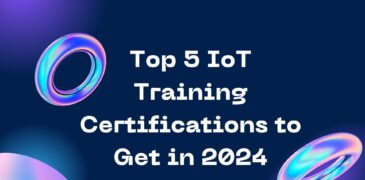Internet of Things (IoT) skills are highly sought after, with certifications providing essential development, networking, and security expertise crucial for job placement. These certifications not only boost career prospects but also keep professionals abreast of the latest industry knowledge, enhancing their credibility. Job opportunities span diverse sectors like manufacturing, transportation, and healthcare, with certified individuals commanding higher salaries than their non-certified peers. By investing in IoT training and certification, professionals can capitalize on the growing demand for IoT expertise, securing rewarding roles and advancing their careers in this rapidly evolving field.
IoT Training Certifications to Get in 2024 are:
Cisco CCNA Industrial IoT Certification
The CCNA certification stands as a testament to an individual’s capability to navigate the dynamic realm of IT, covering crucial aspects like networking fundamentals, IP services, security fundamentals, and automation. Designed for adaptability, CCNA confirms proficiency in managing and optimizing cutting-edge networks prevalent in today’s tech landscape. Upon completing the CCNA training course and exam, professionals gain a versatile foundation, propelling their careers in various directions. Cisco certification becomes a tangible representation of the standard and rigor acknowledged by businesses, instilling trust to meet and exceed market demands.
CCNA equips individuals for roles such as Network Administrator, Network Engineer, System Administrator, and System Engineer. While no formal prerequisites are mandated, a recommended one or more years of experience with Cisco solutions is beneficial. All Cisco certifications maintain active status for three years, requiring recertification through a qualifying exam or earning 30 continuing education credits.
CompTIA Certifications
CompTIA offers a comprehensive range of IT certifications designed to cater to individuals at all levels and across various job roles. The CompTIA ITF+ (IT Fundamentals+) certification provides a foundational understanding of current technology concepts and practices, making it an ideal starting point for those new to IT. For individuals aspiring to build a career in IT, the CompTIA A+ certification serves as a foundational milestone. This certification, achieved through performance-based exams, validates essential IT skills across diverse devices and operating systems, establishing a solid base for further specialization.
Moving up the ladder, CompTIA Network+ certifies the crucial skills necessary for confidently designing, configuring, managing, and troubleshooting both wired and wireless devices. Meanwhile, CompTIA Security+ sets a global benchmark for best practices in IT network and operational security, addressing the rapidly growing field of cybersecurity.
For those interested in cloud technologies, CompTIA offers Cloud+ certification, which validates skills in securely implementing, maintaining, and utilizing cloud technologies. Additionally, CompTIA provides certifications such as Linux+, Server+, CySA+ (Cybersecurity Analyst), CASP+ (Advanced Security Practitioner), PenTest+, and more, each catering to specific skill sets and professional development needs.
AWS Certified Cloud Practitioner
The AWS Certified Cloud Practitioner is a foundational certification that assesses a broad and high-level understanding of the AWS Cloud, its services, and key terminology. This certification is particularly valuable for individuals with no prior IT or cloud experience who are transitioning to a career in the cloud or for business professionals seeking foundational cloud literacy. Priced at 100 USD, the exam is 90 minutes long, consisting of 65 questions in either multiple-choice or multiple-response formats.
AWS provides a comprehensive set of resources to help candidates prepare for the exam. These resources include an exam guide (CLF-C02), official practice question sets, pretests, and various learning paths. AWS offers flexibility by allowing candidates to take the test either at a Pearson VUE testing center or through an online proctored exam. The exam is available in multiple languages, including English, Japanese, Korean, Simplified Chinese, Traditional Chinese, and more.
Candidates can follow a structured preparation plan, starting with familiarizing themselves with the exam and its question styles. Learning about exam topics, exploring AWS Cloud Practitioner Essentials, and engaging in cloud-related quests are crucial steps. AWS provides standard and enhanced exam preparation courses, as well as an innovative AWS Escape Room designed specifically for AWS Certified Cloud Practitioner exam preparation.
Certified Internet of Things Professional (CIOTP) course
The Certified Internet of Things Professional (CIOTP) course is a comprehensive program designed to equip participants with in-depth knowledge of end-to-end IoT concepts. The course focuses on the principles, concepts, techniques, and tools essential for building effective IoT solutions, addressing hardware, software, middleware, communication, IoT programming, IoT cloud, and IoT security.
Participants will gain practical skills in working with popular hardware such as Arduino Uno, NodeMCU, and Raspberry Pi, enabling them to analyze real-life applications and implement electric circuits. The course emphasizes hands-on experience in sending data to IoT platforms using various communication protocols, and participants will develop proficiency in designing and building IoT projects. With an industry-relevant skillset, participants will learn IoT cloud concepts and security measures, covering hardware security, network security, cloud security, and data security. The training includes practical implementation of the MQTT communication protocol, with a focus on security considerations.
Throughout the 32-hour course, inclusive of training and exams spanning four days, participants will not only acquire technical skills but also gain a deep understanding of IoT through real-life case studies. By the end of the program, participants will be capable of analyzing and implementing IoT solutions, interact with sensors and actuators using Arduino Uno and Python programming, and confidently navigate the complexities of IoT cloud and security aspects.
Azure IoT Developer Exam
The Azure IoT Developer Exam measures the skills of professionals responsible for creating and maintaining both the cloud and device aspects of an IoT solution. Candidates possess expertise in configuring and managing devices through cloud services while also handling the setup of physical devices. Their responsibilities extend to maintaining and troubleshooting device configurations throughout their lifecycle.
These developers implement design specifications for IoT solutions, covering device topology, connectivity, diagnostics, monitoring, and security. They are adept at coding to enable seamless two-way communication between devices and the cloud. Additionally, Azure IoT developers deploy modules, configure device networking, and work on the Azure IoT Edge component of the solution. Their role involves designing solutions for managing data streams, encompassing monitoring and data transformation within the IoT context. Collaboration with architects, device developers, data engineers, and other stakeholders is crucial for successful business integration.
Candidates should possess a foundational understanding of device types and Azure services, including data storage, analysis, processing, AI, and other platform as a service (PaaS) options. Proficiency in programming in at least one Azure IoT software development kit (SDK)-supported language is a prerequisite.
The exam content is categorized into several key domains, ranging from setting up the Azure IoT Hub solution infrastructure to implementing security measures. These domains include provisioning and managing devices, implementing IoT Edge, ensuring business integration, processing and managing data, and monitoring, troubleshooting, and optimizing IoT solutions.
Conclusion
In conclusion, securing the top IoT training certifications in 2024 is pivotal for professionals aiming to thrive in the rapidly evolving Internet of Things landscape. Certifications such as Cisco CCNA Industrial IoT, CompTIA IoT+, AWS Certified IoT Specialty, Microsoft Certified: Azure IoT Developer, and Certified IoT Professional (CIoTP) provide the necessary skills for IoT development, networking, and security. These certifications not only enhance career opportunities across diverse industries but also validate expertise in managing and optimizing advanced networks.
Also Read:







